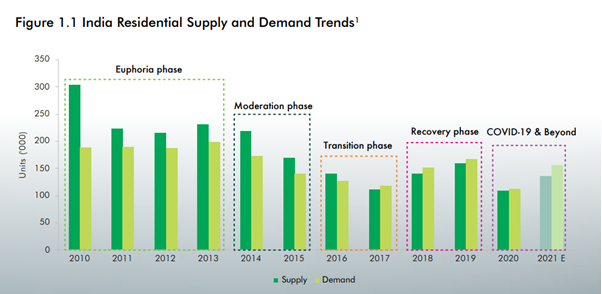Real estate market in India is predicted to have a bright future due to the rapid changes influenced by social factors, economic factors, developing technology, and significant trends. This change is expected to completely alter how real estate is purchased, sold, and occupied, reshaping the real estate market in India.
Bricks and mortar are not the only aspects of India’s real estate future; innovation, sustainability, and adaptability are the primary concerns. Let’s examine all aspects of India’s real estate market and explore the promising opportunities that the future holds.
Table of Contents:
- Real Estate Trends in 2025 in India
- An Overview of the Indian Real Estate Market for 2025 and Beyond
- Current Market Analysis of Real Estate in India
- Emerging Trends and Technologies in Real Estate in India
- What is the Future of Commercial Real Estate in India?
- What is the Future of Residential Real Estate in India?
- Is Real Estate Investment in India Profitable in the Future?
- A comparative Analysis of the Top Global Real Estate Markets
- Conclusion
- FAQs
Real Estate Trends in 2025 in India

There are various factors which influence the Real Estate Trends in 2025 in India:
- The real estate market is using virtual reality for property tours and online transaction platforms, demonstrating the continued prominence of technology integration.
- In order to meet the growing demand in this market sector, government programmes like the Pradhan Mantri Awas Yojana have made affordable housing a priority.
- Because of the changing nature of work and the increase in remote employment, co-working spaces are becoming more and more popular.
- Environmental sustainability is becoming a key factor in real estate choices rather than just a trendy term. The best real estate company in India in 2025 will prioritise eco-friendly development, energy efficiency, and green building practices.
- The Real Estate Regulatory Authority (RERA) has helped the industry become more accountable and transparent.
- Blockchain technology’s improvements in security, transparency, and efficiency have disrupted traditional real estate transactions.
An Overview of the Indian Real Estate Market for 2025 and Beyond
India’s real estate industry is expected to be influenced by a combination of economic factors, government policy, and technological developments through 2025 and beyond.
The real estate industry will be influenced by employment levels, GDP growth, and overall economic circumstances. Ongoing government programmes like housing plans and regulations will also have a big effect on the market, influencing supply, demand, and investor sentiment.
The changing nature of work and the growing acceptance of flexible and remote work arrangements may have an impact on the demand for both residential and commercial property, which in turn may have an impact on the growth of co-working and flexible office space.
In order to successfully navigate India’s dynamic real estate landscape in 2025 and beyond, developers and investors will need to be able to react to shifting buyer preferences and shifts in the market.
Also Read: Top Real Estate Companies in India 2025
Current Market Analysis of Real Estate in India

Growth of Real Estate Market
The real estate market was valued at Rs 12,000 crores (USD 1.72 billion) in 2019. It is projected to reach Rs 65,000 crores (USD 9.30 billion) by 2040. The Indian real estate industry is predicted to grow from USD 200 billion in 2021 to USD 1 trillion by 2030. The rapid expansion of commercial real estate, retail, and hospitality is driving up infrastructure. The real estate industry would account for 13% of the nation’s GDP by 2025.
Key Factors Driving Market Growth
Rapid Urbanization and Population Growth: India is urbanising quickly due to a growing population and a migration of people from rural to urban areas. The urbanisation trend has led to a rise in the need for commercial spaces including office buildings, retail stores, and industrial parks to accommodate the expanding workforce and company.
Government Initiatives and Reforms: In order to stimulate the real estate sector and draw in both international and local investment, the Indian government has implemented a variety of policies and initiatives.
Foreign Direct Investment (FDI) Inflows: Significant foreign investments have been drawn to the real estate sector in India thanks to its liberalised FDI regulations. In addition to bringing finance, these investments also contribute best practices, technology, and foreign knowledge, all of which support the real estate market’s overall growth and development.
Challenges Faced by the Real Estate Sector
The global economy depends on the real estate sector, which is essential to investment, economic growth, and real estate transactions. It does, however, encounter challenges that might limit its growth and financial success, just like any other industry.
- Economic Volatility And Market Fluctuations
- Regulatory Hurdles And Legal Complexities
- Technological Disruption and Innovation
- Rising Costs And Affordability Concerns
- Changing Consumer Preferences And Expectations
Also Read: Top 15 Best Cities for Real Estate Investment in India
Emerging Trends and Technologies in Real Estate in India

- A growing emphasis on smart houses with integrated technology that improves convenience and security is one of the emerging trends in real estate in India.
- With green building certifications and eco-friendly designs addressing environmental issues, sustainable practices are becoming more and more popular.
- Diversification is emphasised in investment trends, with proptech startups getting attention.
- Regional differences in the state of development and shifting customer preferences highlight the need for customised strategies for various markets.
Overall, the sector is seeing a change towards consumer-centric, environmentally friendly, and technology-driven processes, which reflects India’s dynamic and changing real estate market.
What is the Future of Commercial Real Estate in India?

India’s commercial real estate industry has shown continuous growth, defying the worldwide trend that has been faltering in recent years. India’s economy is now the fifth largest in the world, but by 2029 it is expected to become the third-largest economy.
Growth in logistics and distribution facilities is expected to keep pace with the booming e-commerce industry. There will always be a need for flexible office spaces and co-working spaces, highlighting the necessity for flexible real estate solutions. Global economic conditions, technology developments, and the industry’s capacity to adjust to shifting business conditions will all influence how it develops.
If you want to know Investing in commercial properties a good idea in India? then read this blog to learn about commercial properties investment.
Also Read: Tips for Buying Commercial Properties in India
What is the Future of Residential Real Estate in India?

Various trends & shifts in societal preferences, technological advancements, and economic dynamics, have influenced the future of residential real estate in India. Homes with flexible workspaces and improved connectivity may continue to be in demand as remote work becomes a growing trend.
Sustainability will probably continue to be a top priority, as demand for eco-friendly and energy-efficient housing options rises. It is anticipated that technological integration—such as smart home features and virtual reality for property tours—will profoundly alter the home-buying process.
Furthermore, the lack of affordable housing will probably continue to be a concern, inspiring innovative solutions and government initiatives to meet the housing demands of different income groups.
Want to know the process of buying residential properties in India?
Is Real Estate Investment in India Profitable in the Future?
India is a very profitable country to invest in real estate because of several compelling characteristics. The nation’s population growth, fast growth in the economy, and expanding urbanisation all contribute to a high demand for residential and commercial real estate.
The real estate industry is also further boosted by infrastructural improvements, foreign investment, and supportive government policies. The most significant causes are:
Economic Growth: India’s real estate market has benefited from its steady growth in the economy. People’s purchasing power rises in tandem with an expanding economy, which raises demand for real estate.
Rental Income: In India, rental income from real estate investments may be quite appealing. The demand for rental houses has surged due to the fleeting nature of job markets and the entry of a young workforce. This is a great chance for property owners to generate a consistent income stream from rents.
Rapid Urbanization: As we explore the benefits of green building, it’s critical to take into account not just the structural elements but also the aesthetics and comfort of the interior spaces.
Also Read: How to Evaluate Real Estate Investment Opportunities in India
A comparative Analysis of the Top Global Real Estate Markets
| Factors | Global real estate market | Indian Real estate market |
|---|---|---|
| Market Size and Volume | Compared to the Indian real estate market, the global real estate market is far larger. Some of the world’s biggest real estate markets are those in the United States, China, Japan, and the United Kingdom. | In terms of volume and market size, the Indian real estate market is little. However, as a result of rising demand and investment, the Indian real estate industry has been expanding quickly in recent years. |
| Investment Opportunities | A vast variety of investment options are available in the global real estate industry, including residential, commercial, and industrial properties. | In contrast, there aren’t many possibilities for commercial and industrial buildings in the Indian real estate market, which focuses primarily on residential properties. |
| Government Regulations | With several nations having varied rules and regulations controlling the business, the global real estate market is less controlled. | Real estate market in India is regulated by government. Market has its own strict rules and regulations. |
| Cost of Real Estate | Realestate in foreign countries is expensive. However, real estate investments in foreign market yield heigher returns compared to investments in Indian markets. | India offers comparatively more affordable real estate than many other international marketplaces. This can be attributed to declining land prices, reduced building expenses, and the very low cost of living in India. |
| Market Stability | Compared to the Indian real estate sector, the global real estate market is often more stable and less turbulent. This is because there are more investment options and diversity, in addition to the market being more established and mature. | In contrast, the Indian real estate market is more erratic and prone to changes in supply and demand. |
Conclusion:
In general, the real estate sector in India appears to have a promising future, and investors should anticipate plenty of chances in the years to come. In the realm of Indian real estate, there will be a lot of fascinating changes as the sector keeps developing and adapting to changing consumer preferences.
In addition to challenges like shifting market conditions and complicated regulations, there are also chances for development, innovation, and satisfying the changing needs of a changing society. India’s real estate market will focus on building communities, embracing technology, and designing environments that resonate to the country’s shifting ambitions rather than merely constructing buildings.
FAQs
1. What is the forecast for the Indian real estate market in 2025?
By 2025, the Indian real estate market is expected to account for 13% of the country’s GDP. According to trends, there will likely be a sustained emphasis on customer preferences, environmental practices, and PropTech integration.
2. What is the future of real estate in India in 2030?
A recent industry analysis estimates that real estate sales in India will reach $1 trillion by 2030, accounting for 13% of the country’s GDP by 2025.
3. Does real estate have a future in India?
The five years between 2023 and 2028 are expected to have a growth rate (CAGR) of 9.2% in India’s real estate sector. Looking ahead, the Indian real estate sector seems to have a bright future filled with continuous growth and development.
4. Is it a good time to buy a house in India in 2025?
The JLL Home Purchase Affordability Index study predicts that residential real estate will continue to climb within reasonable bounds and reach a three-year high in 2025. The predicted repo rate decrease will fall between 60 and 80 bps range, keeping the cost of real estate within the reach of purchasers.
5. What is the prediction of the real estate market in India?
The India real estate market size is projected to exhibit a growth rate (CAGR) of 8.03% during 2025-2032.
6. Will property rates go down in 2025 in India?
According to a report titled JLL Home Purchase Affordability Index, residential real estate is set to stay within affordable limits and set to rise to a three-year high in 2025.



1 Comment
Comments are closed.